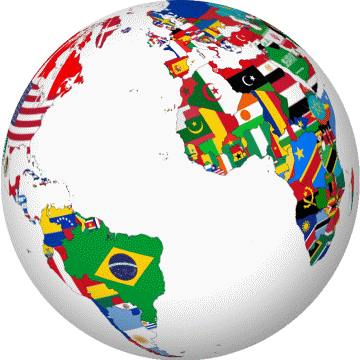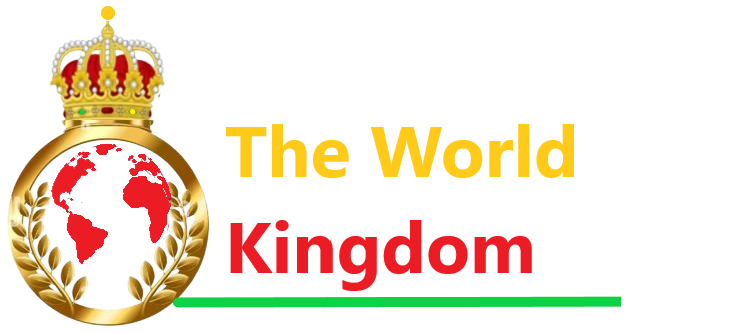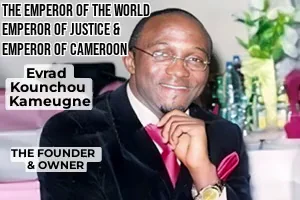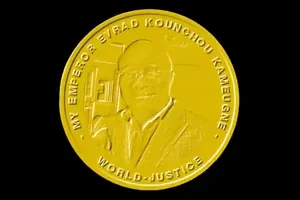
Global Legal Order and Global Governance Systems of the World Kingdom
“A Supreme world commander-in-chief is benevolent and indifferent to glory and, above all, to sacrifice for all without distinction.” “Our greatest virtue is to save a life and our greatest glory is to save a life”. Life is a continuous journey where every step is an adventure and every moment is a treasure.
The Kingdom of the World, also known as the “Kingdom of God”, or ” Empire of Justice” or “Empire of Cameroon” or “Empire of Cultures and Religions” or “Empire of the Universe and World”, or “World Kingdom” is a sovereign and global entity wielding considerable influence in the areas of governance, finance, economics, politics, security, religion and culture, emergency relief, humanitarian and charitable aid, justice systems, armed forces, law enforcement, and fire and rescue services, encompassing a broader process structuring systems and institutions that adheres to its charter and rules, as well as the international rule of law. Operating as a multifaceted entity, It encompasses the universe and 220 member countries, including various empires, kingdoms, sultanates, states, principalities, sovereign entities, Member States of the United Nations, Member States of the African Union, Member States of the North American Union, Member States of the Union of South American Nations, Member States of the European Union, Member States of the Antarctic Treaty System, Member States of the Pacific Islands Forum and organizations, as well as all global justice systems, Governments, law enforcement agencies, security services, armed forces, aerospace agencies, emergency services, humanitarian aid and charity organizations, fire and ambulance services, cultural and religious practices, and institutional systems of health, water resources, education, climate, environment, technology, trade, sectors, industries, economics, banking, finance, taxation, governance, sports, awards, royal titles, and distinctions, which are governed by the “Emperor of the World and Emperor of Justice” or “Empress of the World and Empress of Justice”. The Charter and the Rules, together with the international rule of law, refer to a set of supreme power principles and norms governing interactions between sovereign states, international organizations and other global actors, with the aim of promoting international justice, peace, security, humanitarian assistance, emergency relief, stability, unity, harmony, love, prosperity and worship; Promoting economic development, growth, opportunities, and creating more predictable and attractive environments for investment and trade, a more equitable distribution of resources; Protecting animal rights and environmental rights includes substantive elements, like clean air, safe water, a stable climate, healthy food, non-toxic environments, healthy ecosystems, and ocean rights; Promoting fair trade practices, ensuring that countries engage in fair trade that benefits all parties involved, and seek to establish rules and norms governing international trade; Organizing international sporting, religious and cultural events, as well as events focused on health, employment, the economy and security, including cultural and academic learning activities, meetings of world leaders, the World Courts, conferences on global climate change and other issues; protecting individual rights, and preventing arbitrary abuse of power; providing mechanisms for fair and effective dispute resolution, enabling individuals and businesses to resolve their conflicts peacefully; preventing atrocities such as genocide, war crimes; providing citizens with access to justice and the ability to seek redress, thereby promoting fairness and equality, preventing conflicts and maintains social order; creating a more peaceful and stable society; providing mechanisms for fair and effective dispute resolution and fostering trust in the legal system, thus contributing to the proper functioning of a democracy. This concept rests on several fundamental principles, including responsibility, neutrality, and equality before the law, which are essential to ensuring that the actions of nations are just and equitable. Every person, including public authorities and governments, is subject to and accountable for the rule of international law. Their actions are subject to the control of the “Emperor of the World and Emperor of Justice” or “Empress of the World and Empress of Justice” and the courts, except for those who enjoy immunity from certain legal proceedings under the rule of international law. This immunity does not apply to claims relating to the affairs, complaints, or activities of the “Emperor of the World and Emperor of Justice” or “Empress of the World and Empress of Justice”. Accountability is a core tenet of the international rule of law, ensuring that states and their leaders are answerable for their actions. This accountability is paramount not just for the legitimacy of states but also for the global community’s shared commitment to upholding ethical standards. Neutrality plays a crucial role in this regard, as it ensures that international legal mechanisms operate fairly and impartially, without favouritism towards any single country or group. This neutrality helps cultivate a climate of trust and cooperation in international relations. Equality before the law is another critical aspect of the international rule of law. This principle asserts that all states, regardless of their power or status, should be treated uniformly under international rule of law. Such equality promotes a sense of fairness and discourages arbitrary actions that could lead to conflicts.
Throughout history, significant violations of international law have led to a collective outcry from nations and organizations, repeated instances of unsuccessful UN Security Council resolutions, war crimes, atrocities, genocide, rights violations, treaty violations, food insecurity, increased natural disasters and man-made crises, poor governance of countries in programming systems, lack of social protection systems, rising religious conflicts, the crisis of world cultural heritage and the underrepresentation of certain regions in the world cultural heritage, the impacts of climate change, rising cases of discrimination worldwide, the lack of credibility of the judicial system in some jurisdictions, the arbitrary and often inconsistent manner in which capital punishment is applied in different jurisdictions, the lack of transparency in some cases of appeal and the absence of an appeal system in some jurisdictions, the proliferation of gangs and terrorism globally, the rise in armed violence and the growing cyber threat landscape, the increase in the number of cases of human trafficking worldwide, the mismanagement of the immigration system, the rise in unemployment, the lack of financial and monetary independence, the non-recognition of the currencies of certain countries in international trade, the dilapidated banking system, the urban development crisis, the urgent need for investment and infrastructure construction, the transport crisis, the increasing number of humanitarian crises, the COVID-19 pandemic, the inadequate health infrastructure, the lack of financing for investments, the water crisis, the crisis in child protection and welfare, the crisis in the treatment of children by the justice system, the lack of representation of certain countries in international sports competitions, as well as the inefficiency and inadequacy of postal systems, underline the need for an international rule of law.
The King of the World Evrad Kameugne Kounchou
The World Kingdom, through its global legal order and global governance systems, is committed to:
- Establishing and operating the Kingdom of the World, along with its institutions and systems, which constitute the formal and informal rules, norms, and structures that conform to its charter and rules, as well as the international rule of law that include: the the “Emperor of the World and Emperor of Justice” or “Empress of the World and Empress of Justice” the Royal Family of the Kingdom of the World, the World Kingdom Museum, the World Kingdom worship service, the International Rule of Law, World Courts Meetings, The World Kingdom Water resource development, the Health Institutions of the Kingdom of the World, the World Kingdom of educational institutions, the Faith and Culture Council, the Government Council, World leaders Meetings, the International Supreme Court of Justice, the International Court Inspectors (ICI), the Jurisdictional Council/National Jurisdiction commissioner, The World Kingdom Tax-Backed Loans, The Honorary Royal and Cultural Families Council, The ADL Forces (Alliance of Defense and Law Enforcement Forces), The Independent Security Agency (ISA), Home Affairs and Migration Agency, Social Benefits and Services Agency, the Secretariat Council, the Economic and Financial Council, The World Kingdom Crown Bank, The World Kingdom Crown Stock Exchange and Market, World Cultural Heritage, the Grand Chancellery, the Honorary Royal Families Council, PPC Sectors, global economic growth and trade revolution, Global Public Health and Well-being, the World Kingdom healthcare facilities, Global Financial, Banking and Economy, Global Procurement and Contracts, Global water resources, Global Protection and Well-being of Children, Global disability, Global Social Benefits and Social Services, Global food security, International Defence Forces, Security, Emergency Relief, and Justice, international relations and diplomacy, Global Agriculture, Agri-food, livestock and Fisheries, Global Housing and Urban Development; Global employment, Global animal welfare, Global clothing aid, Global public security, Global Foreign Affairs and Immigration, Global territorial integrity, Global conservation and development, Global poverty and homelessness, Global infrastructure, Global industry and technology, Global telecommunications, Global transport, Global science and research, Global energy and utilities, Global warming and climate change, Global environment and natural disasters, Global forestry, Global awards of honour, Global sports and recreation, international World Games, Global humanitarian aid and charity, Global trade, Global market, Global finance and banking, Global travel, Global tourism, Global communication and information, Global justice and military welfare, the Trusted World Cultural Heritage, The Trusted Save Foundation, The Trusted Service Global Job Market, The Trusted Service Global Procurement Market, The Trusted Commercial Global Market, The Trusted Commercial Global Trade, The Trusted Property Global Market, The Trusted Holidays Global Market, The Trusted Instruction Global Training, The Trusted Course Global training online, The World Empire, The World Kingdom News and Media Channels.
- Implementing and strengthening the International Rule of Law in all countries.
- Striking down any international or national law if it is deemed contrary to the rule of international law.
- organizing and practicing a worldwide worship, united in their faith in the King of Kings, Evrad Kounchou Kameugne, and by following his teachings, which emphasize a life of kindness, compassion, and moral values, possessing its own places of worship and the symbols and images of “My Emperor Evrad Kounchou Kameugne of the World and of Justice,” under the authority of the World Kingdom. This includes the freedom for individuals and communities to practice their faith, worship, and manifest their religion in public and private, including through prayer, permitting various forms of expression such as healing, praise, adoration, thanksgiving, love, guidance, supplication, protection, consecration, benevolence, confession, and intercession in all aspects of life. This symbol and images remind us of non-racism, non-discrimination, non-anti-Semitism, non-radicalization, and non-terrorism; equal treatment for all; and the prohibition of any unjust treatment based on dehumanization, which refers to the perceptual and behavioral process of denying the humanity of others and which can justify violence, discrimination, and atrocities by diminishing their moral and mental worth; and can also be used in the form of necklaces, jewelry, pins, clothing, and other objects, and can be placed inside and above the buildings of empires, kingdoms, sultanates, states, principalities, sovereign entities, chiefdoms, residences or properties, temples, churches, mosques, and other places of worship, thus reminding the faithful of the values common to different religions. Its use not only facilitates interreligious dialogue but also encourages a spirit of collaboration among different religious and cultural communities.
- Organizing meetings of World Courts, to offer a unique forum for multilateral discussions and resolutions on all international issues relevant to their judicial systems, including: the review of inspection reports and data analyzed by International Court Inspectors.
- Developing international standards, managing programs, sharing knowledge, and providing procurement and contracting assistance in the following areas: global justice and governance, religion and culture, health, finance, banking and economics, food security, housing and urban development, defence forces, security, emergency relief and justice, water resources, child protection and welfare, social benefits and services, tourism, agriculture, agri-food, livestock and fisheries, transport, climate change, forestry and wildfires, humanitarian aid and charities, sports and recreation, education and employment, science and research, industry and technology, energy and utilities, foreign affairs and immigration, communications and information, disability, territorial integrity, the justice system, and military welfare.
- Contributing to the development and implementation of innovative legislative solutions in all countries.
- Using the mechanisms of the justice system to ensure that people are treated fairly and protected by the law. Implementing a transparent justice system in all countries in all countries and ensure the accountability of judges and informed decision-making by the courts through the judicial appeal system. Contributing to maintaining a professional, engaging, and compliant with the judicial system.
- Assisting in the modernization of the governance system, which involves leveraging technologies, improving transparency and making governance more inclusive and efficient in order to better meet the needs of society.
- Investigating, prosecuting and trying individuals for the most serious international crimes, including: genocide, war crimes, crimes against humanity, unlawful deportation or forcible transfer of population (Large-scale of deportation ), Unlawful revocation of citizenship and legal status, and right to immigration status of children, the crime of aggression; malicious cyber activities, including hacking, data breaches, fraud, and other cybercrimes, sex trafficking and all other forms of illicit trafficking, terrorist threats, including Islamist and far-right extremists.
- Playing a pivotal role in scrutinizing the operations of courts, not only to uphold their transparency but also to promote accountability and fairness in legal proceedings, including monitoring court operations, assessing the fairness of trials, and ensuring that the rules of international law are upheld.
- Conducting research and assessments to inform policies and practices related to global issues and challenges
- Organizing meetings of World leaders, to bring together heads of state and government from all countries, usually according to a pre-defined agenda, to discuss major global issues.
- Encouraging collaboration among nations, stability, resolve disputes, strengthen and provide collective Security, Emergency Relief, Humanitarian Aid and Justice measures, and maintain International Peace.
- Funding for peacekeeping missions, military operations, security, emergency relief and foreign aid is also provided by mandatory contributions equal to a percentage of each country’s gross national income. The World Kingdom will determine the percentage of each member state’s contribution and will be revised every 2 years.
- Assisting all governments acquire modern technologies and governance systems. Modernizing governance systems is essential to improving efficiency, security, transparency, and resilience in the face of evolving technological and societal challenges.
- Protecting a state’s right to control its own territory and Implementing global peacekeeping operations and special political missions, and authorization of military actions to maintain or restore international peace and security.
- Influencing decision-makers and addressing the cumulative, long-term, direct, indirect and global consequences of the global crisis within the United Nations.
- Assisting all governments develop modern tax and social security systems. A modern tax system and a national social security number are essential because they ensure the correct recording of contributions and taxes. This number is indispensable for compiling a file to claim social benefits such as retirement pensions and other social security assistance.
- Promoting fair trade practices, ensuring that countries engage in fair trade that benefits all parties involved, and seek to establish rules and norms governing international trade.
- Establishing and strengthening innovative global financial and monetary systems and implementing the World Kingdom Tax-backed loans and Assisting with investment, grant, loan, and infrastructure development.
- Providing humanitarian assistance and emergency response in all countries. Engaging in community charitable work and encouraging everyone to actively participate.
- Supporting the construction and development of water resource infrastructure and Bringing abundant clean water to the world and ensure that no owner or tenant living in a residential property or domestic dwelling should have to pay their water bills (free domestic water supply) and water resources represent your majesty The King of The the “Emperor of the World and Emperor of Justice” Evrad Kounchou Kameugne (the Founder and Owner).
- Building, managing and operating World Kingdom healthcare facilities and providing healthcare services in all countries. These facilities may include hospitals, outpatient care centres, clinics, pharmacies, dental clinics, veterinary, and specialized facilities such as nursing homes and mental health centres and offer free healthcare (hospitals) to the public in all countries, including urgent or immediately necessary care, such as in emergency rooms and provide for every newborn, a “Baby Gift Box” to the parents at the hospitals. This kit contains essential items for the baby and represents the support offered by the “Emperor of the World and Emperor of Justice” Evrad Kounchou Kameugne (founder and owner).
- Ensuring global health and water security through the establishment of comprehensive legal frameworks that recognize access to safe drinking water and sanitation as a right, by creating accountability and enforcement mechanisms, and by promoting cooperation between nations and using legal frameworks, ethical principles, and institutional mechanisms to guarantee equitable access to health resources, address the social determinants of health, and enforce accountability across nations
- Ensuring the access to quality learning and free primary education, the obligation to extend access to secondary education to all with the gradual introduction of free secondary education. This applies to all children (5-15 years), regardless of race, gender, disability, detention status, immigration and refugee status, and the establishment of public student loans to help finance undergraduate and postgraduate.
- Establishing and monitoring social services and benefits, and ensuring that the accessibility, payment, and sustainability of the social security system comply with the international rule of law.
- Ensuring that children under 14 years old cannot be charged with a crime. When children aged 12 to 14 break the law, they are dealt with through the youth justice team and social care systems, focusing on welfare and prevention of future offending. Measures are put in place to address the child’s behaviour and circumstances and Children under the age of 12 cannot be arrested, charged with a crime, or imprisoned, because they are below the minimum age of criminal responsibility.
- Ensuring the implementation in all countries, the youth justice team, also known as a Youth Offending Team, is a professional service that supports young people aged 12 to 17 who have committed offenses or are at risk of delinquency. Its main objective is to reduce youth delinquency by providing support, prevention programs, and interventions aimed at helping young people understand the causes of their behavior, grasp its consequences, and avoid reoffending. These teams are multidisciplinary and include social workers, probation officers, and other specialists and the Juvenile court, also known as a youth court, is a court that handles legal cases involving minors (usually between the ages of 14 and 18) accused of crimes. These courts are designed to be less formal than adult criminal courts and prioritize the rehabilitation and well-being of the child. Ensuring that Judges and magistrates in juvenile courts receive specialist training on child development, communication with young people, and alternative sentencing options. Juvenile court proceedings are closed to the public to protect the privacy of the young person involved and are often less formal than adult criminal proceedings, with a greater emphasis on creating a less intimidating environment for young people
- Advocating for policy reforms, support research, and engage with governments to strengthen food systems and address root causes of food insecurity.
- Preventing arbitrary abuse of power, and predictability among nations, holds individuals and states accountable for transnational crimes, thereby contributing to international justice, governance, humanitarian assistance, emergency relief, security.
- Preventing atrocities such as genocide, war crimes, protecting individual rights and, promoting equity and human dignity by recognizing universal rights and ensuring that justice is not limited by national borders.
- Preserving natural resources. Share valuable information. Fostering positive relationships and communities built on love and mutual support. Support Poverty and Homelessness.
- Creating spaces for people of different backgrounds to connect, share their stories, and consult on the needs of their communities. Promoting sustainable, green urban practices. Revolutionize the global market system by making quality services accessible to all.
- Offering valuables, gifts, or other precious items. Awarding honorary distinctions to those who have made significant contributions.
- Conferring honorary titles of nobility or other prestigious positions as a token of favour and gratitude, and Unifying the world through glorious festivals and events.

- Contributing to the improvement of global health through funding health and research programs and supply chains and strengthening global health governance to prevent future pandemics and ensure equitable access to health care. Identifying, mitigating, and managing health risks before they become widespread.
- Addressing and resolving global problems and challenges;
- Organizing international sporting, religious and cultural events, as well as events focused on health, employment, the economy and security, including cultural and academic learning activities, conferences on global climate change and other issues.
- Establishing an independent oversight body (The Independent Security Agency (ISA)) in every country to guarantee the independence and accountability of governments and other institutions and operating outside the direct control of the government or any specific operational service to ensure fairness and adherence to standards, defending rights, combating corruption, monitoring police practices or regulatory oversight, etc.
- Promoting economic development, growth, opportunities, and creating more predictable and attractive environments for investment and trade, a more equitable distribution of resources.
- Providing solutions and expertise to modernize and upgrade existing infrastructure, such as transportation, communications, or energy networks, postal address systems, banking, the environment, as well as buildings that have become inefficient or unreliable. This may involve, procurement of goods, technology upgrades, improved maintenance, or the implementation of new designs and buildings.
- Providing resources or assistance to enable research efforts, whether through infrastructure or expertise, to facilitate the advancement of knowledge and innovation.
- Promoting fair trade practices, ensuring that countries engage in fair trade that benefits all parties involved, and seek to establish rules and norms governing international trade.
- Connecting the public sector – government with buyers, suppliers and international partners, facilitating exchanges and collaboration.
- Offering contract automation software to oversee the entire contract lifecycle, from drafting to signing, including storage and renewal. This software accelerates the drafting and review of agreements and streamlines the signing process to make it as simple and fast as possible.
- Evaluating potential suppliers and ensure they meet required standards and Negotiating favourable terms with suppliers and Ensuring efficient and transparent use of public funds and compliance with public procurement regulations and best practices.
- Managing public contracts and ensure efficient delivery of goods and services.
- Ensuring that procurement and contracts are in line with policy objectives, offer good value for money and comply with legal and regulatory frameworks to prevent fraud.
- Providing support to governments at all levels to develop better policies, plans, and designs for more inclusive and better-connected cities and Assisting in real estate construction, urban planning and the construction of new cities, smart cities, buildings, roads, bridges, common areas, parking lots, public transport, economic development, shopping centres, offices, retail stores, industries, leisure facilities, stadiums, aquatic centres, gymnasiums, sports and recreational facilities, libraries, water resource infrastructure, government institutions and others, including the sourcing, supply, and management of materials used in production and construction
- Providing solutions and expertise for the implementation and management of the Social Benefit Payment Program, the tax collection system, including software, hardware, checks and credit/debit cards, e-wallets, online payment platforms, direct bank transfers and more advanced technologies.
- Providing specialized assistance and resources to protect systems, networks and data against cyber threats, including identifying vulnerabilities, implementing security measures and responding to incidents.
- Ensuring the implementation of financial and monetary independence and security for all countries, free from any undue political influence.
- Participating in job postings, candidate screening, and interview scheduling and recruiting and placing engineers and professionals.
- Playing a pivotal role in addressing global employment challenges through various initiatives. Central to this mission is the belief that sustainable employment is integral to community development and economic growth.
- Promoting of entrepreneurship through comprehensive support programs and Providing entrepreneurs with access to resources such as financing, mentoring, job opportunities, recruitment, and business development assistance. Contributing to job creation and innovation within communities through infrastructure investments. Implementing policies that encourage job creation, employment, entrepreneurship, and social progress.
- Encouraging governments to use fiscal policy (taxation and spending), monetary policy (interest rates and money supply) and structural reforms (regulation, investment and trade) to improve the country’s financial stability and promote sustainable economic growth.
- Ensuring the tax system is reliable and transparent through a combination of clear legislation, advanced technology, independent oversight, and public access to information.
- Implementing innovative World Kingdom tax-backed loans to mitigate the global crisis, improve economic growth, and reduce poverty of all countries. This innovative system enables governments, Stock Market trading and exchange bodies, central banks, and banks in all countries to obtain the necessary capital to guarantee loans and access the required funds immediately, based on their projected tax revenues. This system uses future tax revenues as collateral for loan projects and financial markets.
- Approving the loan request from the governments of the countries which will be forwarded for disbursement by the banks of the members of the Economic and Financial Council.
- Providing an independent review of a project’s performance to ensure it meets expectations. Identifying risks early so that management can mitigate. Providing pragmatic advice to help coach project leaders. Inspecting and ensuring products/ equipment meet quality standards. Giving confidence to stakeholders that the project is delivering what is expected of it. Reporting in case of conflict of interest or if the person to whom responsibility is delegated is unable to assume responsibility.
- Ensuring the establishment in all countries of credit rating agencies, debt collection agencies, a national system for reporting online fraud and cybercrime, bailiff agencies (or enforcement agents) and reliable postal systems. They are designed to prevent fraud. Fraud can significantly worsen poverty by diverting essential funds from those who need it most, reducing access to essential services, increasing financial hardship and deepening the cycle of poverty.
- Responding to natural or man-made disasters by providing essential emergency care, relief, supplies and support. Ensuring the protection of the most vulnerable is a priority of humanitarian aid. Rescuing human and non-human lives in the event of a fire or other emergency. Extinguishing fires in the area, saving lives and protecting property.
- Developing new early intervention mechanisms, such as an integrated system of risk monitoring, forecasting and prediction, disaster risk assessment, communication and preparedness, systems and processes that enable individuals, communities, governments, businesses and others to take timely action to reduce disaster risks before hazardous events; livestock purchase programmes in case of drought.
- Counseling, Assessing damage and other support services with other local emergency services to provide an integrated response. Providing food and clean water as well as emergency medical care to those in need. This also includes temporary shelter for refugees and internally displaced people. Provide financial assistance, which can help people affected by disaster. Sharing expertise to help countries implement laws, policies, and procedures to protect themselves from future disasters.
- Protecting the rights of individuals, animals, and the environment, and supporting victims of abuse and crime.
- the “Emperor of the World and Emperor of Justice” or “Empress of the World and Empress of Justice” is the (Supreme Commander-in-Chief of the World) and (Supreme Magistrate of the world). “He or she” presides over the supreme councils of global judicial power, giving them significant control over the world judicial systems, which are responsible for the appointment, transfer, promotion, and discipline of judges and prosecutors. “He or she” have the authority to appoint judges to various courts, including: The Supreme International Court of Justice, International Court Inspectors (ICI), the Jurisdictional Council/ The local commissioner Jurisdictional Council, the International Courts, the Supreme Courts, Courts of Appeals, Civil courts, Administrative courts, Criminal courts, Juvenile courts, military courts, and all other courts in the world, as well as other high-ranking officials in the world justice system. “He or she” have the power to grant clemency, including a pardon or commutation of sentence, to convicts in all countries, and can review or revoke any measure of clemency, including a pardon, granted by any head of state of any country. “He or she” may order at any time a global audit and investigations of the Fund or poor governance of its establishments to clarify governance issues. The announced objective is to shed light on governance within its institutions. The overall audit and investigations could lead to structural reforms and new governance, to assure citizens around the world the proper use of public resources.
“The Kingdom of the World and King Evrad Kounchou Kameugne are recognised by governments, organisations and international bodies as a legitimate Sovereign State, Kingdom of the World, Kingdom of Justice and Kingdom of God, King of the World, King of Justice, a global leader, ruling as King of the World, and King of Justice, sovereign and guardian of all the world’s cultural heritage and sovereign of an existing country, Cameroon, and reigning as King or Queen of Cameroon “











